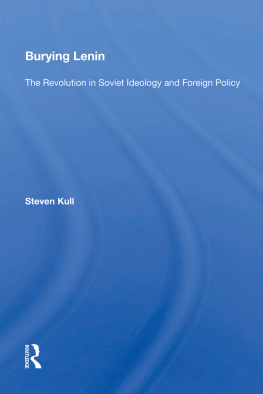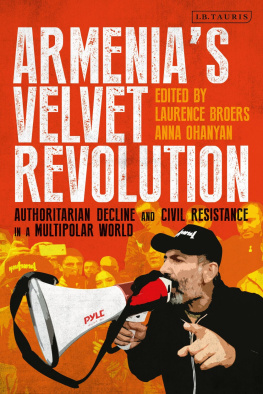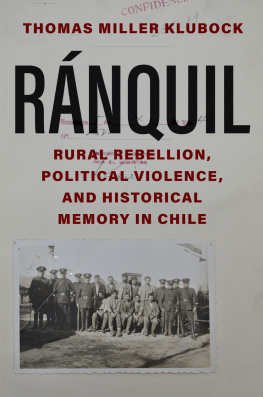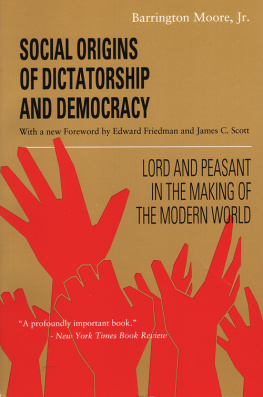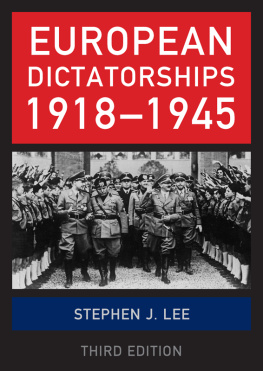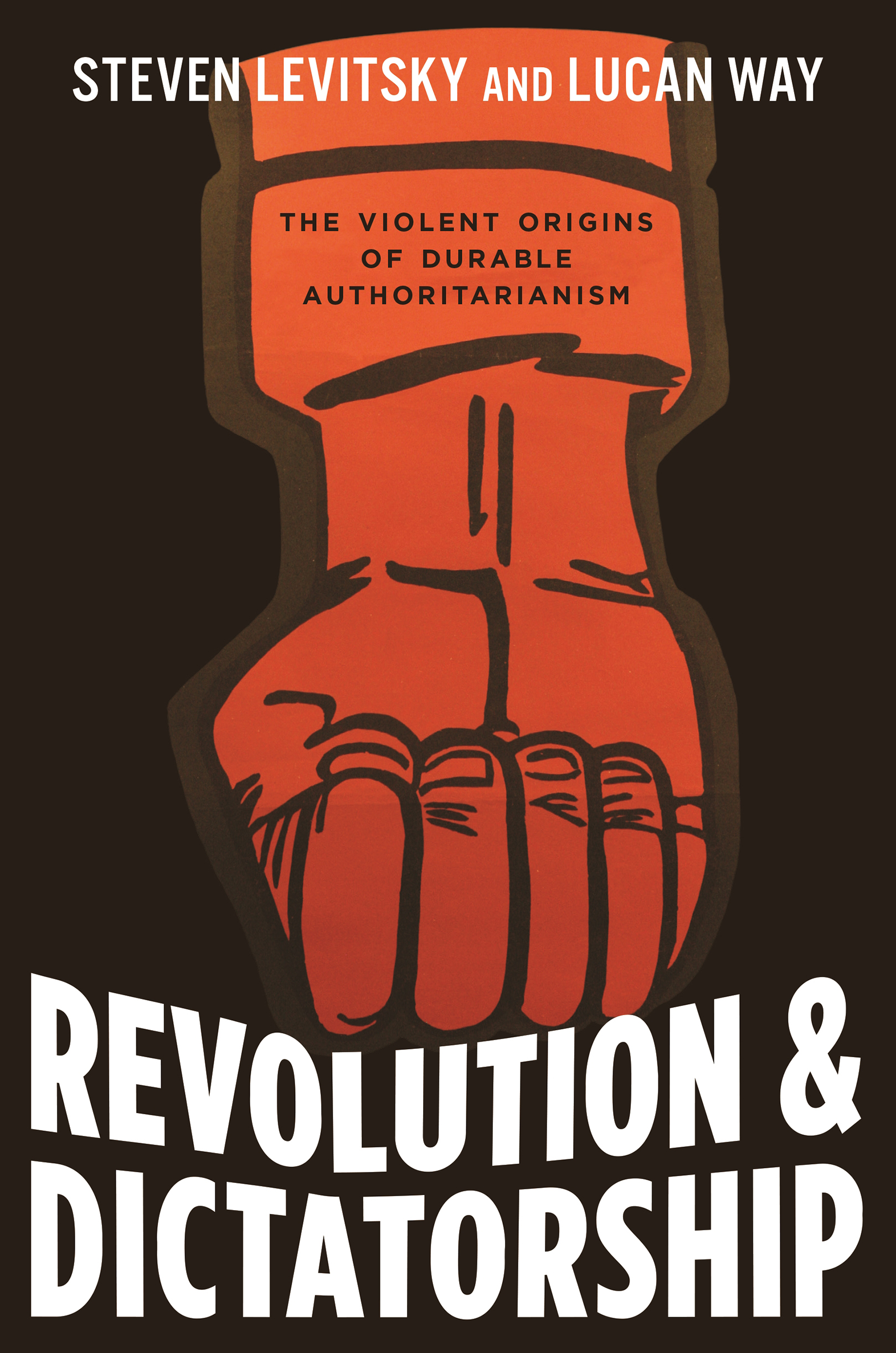REVOLUTION AND DICTATORSHIP
Revolution and Dictatorship
THE VIOLENT ORIGINS OF DURABLE AUTHORITARIANISM

Steven Levitsky
Lucan Way
PRINCETON UNIVERSITY PRESS
PRINCETON & OXFORD
Copyright 2022 by Princeton University Press
Princeton University Press is committed to the protection of copyright and the intellectual property our authors entrust to us. Copyright promotes the progress and integrity of knowledge. Thank you for supporting free speech and the global exchange of ideas by purchasing an authorized edition of this book. If you wish to reproduce or distribute any part of it in any form, please obtain permission.
Requests for permission to reproduce material from this work should be sent to
Published by Princeton University Press
41 William Street, Princeton, New Jersey 08540
99 Banbury Road, Oxford OX2 6JX
press.princeton.edu
All Rights Reserved
Library of Congress Control Number: 2022932449
ISBN 9780691169521
ISBN (e-book) 9780691223575
Version 1.0
British Library Cataloging-in-Publication Data is available
Editorial: Bridget Flannery-McCoy, Alena Chekanov
Jacket Design: Heather Hansen
Production: Erin Suydam
Publicity: James Schneider (US), Kathryn Stevens (UK)
Jacket Credit: colaimages / Alamy Stock Photo
Steve dedicates this book to Liz Mineo and Alejandra Mineo-Levitsky
Lucan dedicates this book to Victor (dziadzio) Erlich (19142007)
CONTENTS
- ix
- With Jean Lachapelle and Adam Casey
- With Adam Casey and Jean Lachapelle
ACKNOWLEDGMENTS
THIS BOOK IS THE PRODUCT of nearly three decades of collaboration. It emerged out of an argument made in our first book, Competitive Authoritarianism, linking the origins of violent regimes to robust authoritarian party-states. In many ways, however, the book would never have been possible without the collaboration of two young scholars who began their careers at the University of Toronto: Adam Casey and Jean Lachapelle. Adam led our effort to code all autocracies since 1900. His encyclopedic knowledge of authoritarian regimes, bulldog intensity, and readiness to challenge our preconceived expectations about specific cases resulted in the Revolutionary Autocracies Data Set 19002015, which is backed up by nearly 500 sources and forms the basis of the books statistical analysis (the data set is available at ). The book benefited enormously from Jeans careful work and analytical perspicacity. The statistical analysis is presented in greater detail in Jean Lachapelle, Steven Levitsky, Lucan Way, and Adam Casey, Social Revolution and Authoritarian Durability, World Politics 72, no. 4 (2020). We are also thankful to Gabriel Koehler-Derrick and Kai Thaler for their research assistance.
We also could not have written this book without critical institutional support, including a generous grant from the Social Sciences and Humanities Research Council of Canada (Insight Grant No. 435120767, P.I. Lucan Way). The grant allowed us transform the project from a kernel of an idea into a full-blown book. Steve benefited enormously from a faculty leave grantand countless other forms of supportfrom the Weatherhead Center for International Affairs at Harvard University. We thank the Harvard Academy for International and Area Studies for generously sponsoring our book conference. Lucan is also thankful for the intrepid enthusiasm and support of his colleagues at the Centre for European, Russian, and Eurasian Studies at the University of Toronto, as well as the outstanding collection at Robarts Library at the University of Toronto.
The book project was enriched by comments from numerous friends and colleagues. James Mahoney, whose own work influenced our book in a variety of ways, provided early encouragement and generous feedback at various points along the way. Dan Slater was a constant source of critical insight from the projects earliest stages. Our long-standing exchange with Dan and his research improved the book in countless ways. The authors also thank Alicia Holland for suggesting the idea of segmented radicalism in Mexico. Eva Bellin, James Mahoney, Tom Pepinsky, Dan Slater, Milan Svolik, and David Waldner generously spent a day digging into our project at a conference, which dramatically improved the book. Mark Beissinger provided constant encouragement and detailed advice on the statistical analysis and made sure that we did not exclude Finland from the analysis. Lynne Viola generously bestowed early encouragement and multiple rounds of feedback on the Soviet chapter. Kevin Luo closely read early versions of the China chapter and helped us to avoid several embarrassing mistakes. Ajmal Burhanzoi, who lived through the Talibans seizure of power in 1996, provided helpful comments on the Afghanistan case study. Numerous colleagues provided feedback at various stages of the project, including Robert Austin, Nancy Bermeo, Keith Darden, Larry Diamond, Jorge Domnguez, Henry Erlich, Mark Erlich, Tulia Falleti, Diana Fu, Jack Goldstone, Jeff Goodwin, Peter Gourevitch, Frances Hagopian, Randall Hansen, Stephen Hanson, Jingkai He, Alisha Holland, Pavlo Kutuev, Adrienne LeBas, James Loxton, Julie Lynch, Andrei Melville, Anne Meng, Lynette Ong, Mitch Ornstein, Adam Przeworski, Phil Roessler, Mariano Snchez Talanquer, Ed Schatz, Oxana Shevel, Kai Thaler, Kathleen Thelen, Josh Tucker, Yuhua Wang, Joe Wright, and participants in seminars at Harvard, the University of Toronto, the University of Pennsylvania, Brigham Young University, the University of California, Berkeley, Fudan University in Shanghai, Gothenberg University, the Higher Economic School in Moscow, the Kyiv Polytechnic Institute, the University of Michigan, New York University, the University of Notre Dame, Stanford University, Stockholm University, the University of Sydney, Tulane University, the College of William and Mary, and Yale University.
John Donohue and Amelie Tolvin did a wonderful job proofreading the manuscript and tracking down innumerable missing citations.
We are also indebted to Princeton University Press, particularly Eric Crahan and Bridget Flannery-McCoy. Bridgets engagement with the project and extensive commentary on early chapter drafts dramatically improved the quality of the book.
Finally, some personal notes of gratitude. Ron Suny witnessed Lucans transformation from spaced-out kid to absent-minded professor and inspired a lifelong interest in Soviet politics. Lucans wife Zareen and their twin boys, Idris and Kamran, provided encouragement and put up with the mountains of books on Stalin that still litter the house.
Steve thanks his two role models, Liz Mineo and Alejandra Mineo-Levitsky, and dedicates this book to them.
Lucan dedicates this book to his step grandfather, Victor (dziadzio) Erlich (19142007). Victor was a toddler in Petrograd during the Russian Revolution, suffered the death of his father to Stalinist repression, and barely escaped the Holocaust before migrating to the United States, where he had a long and distinguished career as a professor of Russian literature. Despite his brush with some of the twentieth centurys worst tragedies, Victor was preternaturally happy, eminently approachable, and exuded an infectious warmth and humor that persisted until his final breath. He is sorely missed.
CHAPTER ONE
A Theory of Revolutionary Durability


